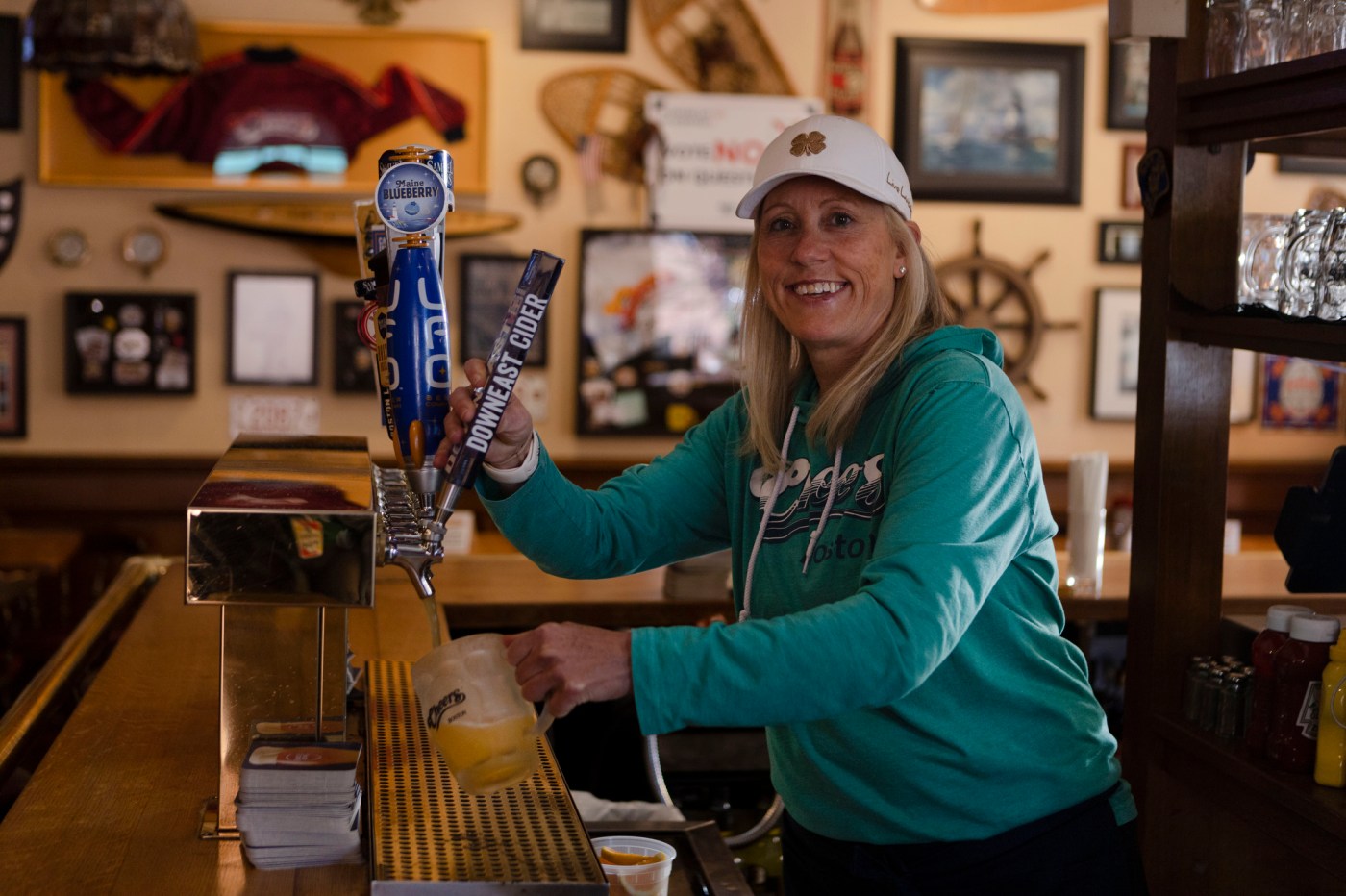
Massachusetts ballot Question 5: An ‘existential threat’ to restaurants or a boon to workers?
Lisa Roberts stumbled into Cheers as a 25-year-old with a job, not knowing how long she’d work at the popular Beacon Hill restaurant.
Nearly 30 years later, the Roslindale resident is still there, prepping the bar an hour before doors open at the pub across the street from the Public Garden and a couple blocks down from the State House.
“That’s my livelihood,” Roberts told the Herald on Friday when asked how much she depends on tips from patrons and about the ramifications of Question 5, a ballot measure that would gradually increase the wage of tipped employees until it meets the state minimum wage in 2029.
Even as a popular restaurant that inspired a TV series and located in an area of Boston that receives hordes of tourists, Cheers provides the statewide $6.75 minimum wage for tipped employees, Roberts said.
If voters approve Question 5 on Nov. 5, tipped employees would earn at least $15 an hour, and tipping would continue to be permitted. The ballot measure would also allow employers to decide whether their employees are required to participate in a tip pool, meaning tips could also be distributed to non-service staffers.
Roberts called Cheers a “great place to work,” where she receives health insurance, 401K, schedule flexibility, and meets people from all over the world. But she fears the toll that Question 5 could pose if approved.
“We rely on tips,” she said. “It’s going to turn people off from tipping knowing that we are getting more money. We’re not working for minimum wage. We’re working for our $40 an-hour wage that we make engaging with our customers.”
Pro: ‘Working on tips is really difficult’
National advocacy group One Fair Wage brought the measure to the ballot after garnering enough support last spring, clearing the threshold only by 136 signatures.
Grace McGovern, who works at a Boston brewery, coordinates advocacy outreach efforts locally. She sees Question 5 as bringing a “very needed change.”
“Especially working in a city like Boston, working on tips is really difficult,” McGovern told the Herald on Thursday.
She said she typically makes minimum wage during the slower months, January through March, and some workers end up being cut. It’s also not guaranteed that all patrons provide a friendly tip as is, McGovern said.
“I have seen myself and my co-workers bust their butts serving a table,” she said, “and get either zero on a check or get 5 to 10% which in the current system is really not enough.”
Anti: ‘Greatest existential threat’
Neil Levine has been in the restaurant industry since age 14 and has owned Maguire’s Bar & Grille on Route 106 in Easton since 1993. He sees Question 5 as being “devastating” for everyone including the state.
Levine believes the state could see payroll tax and meals tax revenues drop if costs increase, servers make less money, and people go out to eat less frequently.
“I consider this the greatest existential threat to our industry since COVID decimated us a few years back,” he told the Herald on Wednesday. “A lot of places will not survive this.”
Maguires employs roughly 50 total staffers including roughly 20 part- and full-time servers and bartenders, “a lot” of whom are “long-term” and “very well-compensated,” Levine said.
He predicts his annual operating costs will increase by about $189,000 if Question 5 goes through, directly impacting the income of the restaurateurs already operating on “razor-thin margins.”
“People think that restaurant owners are multimillionaires,” Levine said. “The truth is we’re middle-class business people struggling to survive and pay the rent.”
Tipping point
USA TODAY conducted a two-week survey in September 2023 examining tipping culture in the country. It found the average tip percentage in the U.S. is 17.94%, with Massachusetts above that amount at 18.37%.
California residents were found to tip the most, averaging 22.69%. The Golden State is one of the seven states with a One Fair Wage policy. Minnesota, Montana, Nevada, Alaska, Washington and Oregon also have implemented it.
Tipped workers in states without a subminimum wage earn 10–20% more than those in states with a lower-trier wage system, like Massachusetts, the Political Economy Research Institute at UMass Amherst found in a report released on Thursday.
Restaurants also face “only modest cost increases” of about 2%, it found.
One Fair Wage President Saru Jayaraman, who resides in California, told the Herald the campaign started 10 years ago when restaurant workers in Massachusetts asked for help to start it.
“The fact that these workers get $6.75 plus tip in the state that is the second most expensive state, after California, in the country is absurd and ridiculous,” she said.
“It’s pretty straightforward what this is,” she added. “It’s the opposition that’s complicated it with a lot of money behind a huge misinformation campaign. It’s very, very clear.”
The Committee to Protect Tips, a coalition registered in opposition to Question 5, has reported over $1.5 million in contributions, according to the state Office of Campaign and Political Finance. One Fair Wage Plus Tips MA Committee has reported $990,936.53 in contributions in support.
In states that have raised the minimum wage over the past few years, restaurants have increased prices, reduced employee hours, and cut jobs, Harri, a national software developer for restaurants, found in 2020.
“In the other states, people are leaving the industry, restaurants are closing,” Julie Dobson, a bartender at Sullivan’s of Castle Island in Hanover, told the Herald. “I don’t want to lose my job. We make more than $15 an hour. I don’t know why they want to do this to us.”
Elizabeth Ledo has worked for over 30 years at various restaurants and catering businesses across southeastern Massachusetts and Rhode Island. She called Question 5 “long overdue,” with wage theft and worker exploitation “very rampant.”
“I have had many shifts where I was either screwed out of tips when I know I gave great service,” Ledo said, “or been under-tipped when I made a considerable amount of profit for the establishment.”
Neil Levine, owner of Maguire’s Bar & Grill, says Question 5 is an ‘existential threat’ to the restaurant industry. (Lance Reynolds/Boston Herald)

